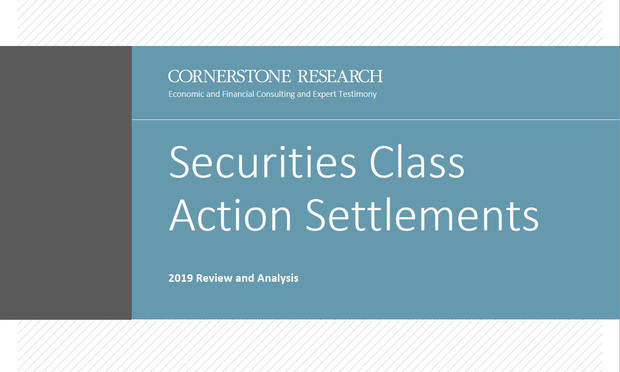Pharmaceutical Sector Hit Hardest by Securities Class Actions
"That suggests a real trend here. No longer can we say half of all settlements are less than $10 million, and that can be a concern to general counsel."
February 26, 2020 at 03:50 PM
5 minute read
The original version of this story was published on Corporate Counsel
 Securities Class Action Settlements: 2019 Review and Analysis by Cornerstone Reasearch.
Securities Class Action Settlements: 2019 Review and Analysis by Cornerstone Reasearch.
A new report analyzing 2019 securities litigation suggests the volume of class actions and the size of their settlements will likely continue at high levels in upcoming years, especially in the already hard-hit pharmaceutical sector.
That's the main takeaway for general counsel from the "Securities Class Action Settlements—2019 Review and Analysis," according to Laura Simmons, the report's co-author and a senior research adviser at Cornerstone Research.
The study found that the median settlement value was $11.5 million in calendar year 2019, a 34% jump over the 2010 to 2018 median. It said the settlement value "was driven primarily by an increase in the overall percentage of midsized cases in the $5 million to $25 million range as well as a decrease in the number of smaller settlements."
The overall settlement amount was lower than in 2018, Simmons noted, due to five unusually large cases that year, including the $3 billion deal with Brazilian energy giant Petrobras.
But the median, or typical, case value remained high.
"This is the second year in a row that we've seen a typical case settle at that value," Simmons told Corporate Counsel on Wednesday. "That suggests a real trend here. No longer can we say half of all settlements are less than $10 million, and that can be a concern to general counsel."
Simmons noted that the number of settlements, 74, also continued at a high rate. But it was still less than the 78 tallied in 2018.
 Laura Simmons, Cornerstone Research.
Laura Simmons, Cornerstone Research.She also pointed out a "dramatic increase" in the size of defendants. "It's a result of a combination of the overall size of firms increasing, and then what appears to be plaintiffs targeting larger firms."
Total assets of 2019's defendant firms were more than double the prior 10-year median, according to the report.
Joseph Grundfest, director of the Stanford Law School Securities Class Action Clearinghouse, said in a statement that the continued growth of publicly traded firms "is fueled, at least in part, by a decrease in [initial public offering] activity and an increase in merger activity. This trend, combined with the heightened filing activity against public companies, may contribute to sustained levels of higher settlement amounts."
Laarni Bulan, report co-author and Cornerstone research principal, said in a statement that the larger issuer defendants "may also cause plaintiff firms to pursue potential claims more vigorously. One possible measure of the time and effort by plaintiff counsel is the number of docket entries per case. In 2019, average docket entries were the highest in the last 10 years, primarily driven by cases with relatively large damages."
Simmons also pointed out an increase in settlements despite a substantial reduction in accounting issues. Less than 20% of the cases involved financial restatements, she said, "and those used to be a focus in these cases."
Simmons said it must be alarming for general counsel that companies can assure a good system of accounting practices and internal controls, but if any unexpected event—like a wildfire or a coronavirus—makes stock prices drop, then they can expect plaintiffs to be right there. "The event-driven litigation trend has emerged in recent years," she noted.
One caveat for in-house counsel: don't conclude that accounting isn't important anymore. That's because cases that do involve financial restatements settled for higher amounts than those that didn't.
Simmons said all of the general counsel concerns she discussed were amplified for the pharma sector "because this industry is being targeted."
In 2019 pharma cases reached an all-time high in both the number and percentage of overall cases. Pharma saw 22% of all securities case settlements. "This is a heavy concentration for a single sector," Simmons noted.
Research shows another 34 cases filed recently against pharma defendants, she said, "suggesting that the prevalence of these cases will continue."
Simmons said one finding in the report surprised her: The proportion of settlements in 2019 with a public pension plan as lead plaintiff reached its lowest level in 10 years. Pension funds usually get involved with larger cases, she said, and these class actions have been growing in settlement size.
So why are pension funds backing off? Simmons cited a number of possible factors, including changes in relationships with more and newer plaintiff counsel, and a questioning of the cost-benefit trade-off in serving as lead plaintiff.
In other findings, the report said in 2019:
- Companies that settled cases after a ruling on a motion to dismiss were, on average, 50% larger than companies that settled while the motion was pending, perhaps suggesting that bigger companies are more willing to take risks.
- Some 53% of settled cases involved an accompanying derivative action, the second-highest rate over the past decade.
- There were other signs that plaintiffs are being more aggressive. For example, the length of the class period increased to its highest level over the last 10 years.
This content has been archived. It is available through our partners, LexisNexis® and Bloomberg Law.
To view this content, please continue to their sites.
Not a Lexis Subscriber?
Subscribe Now
Not a Bloomberg Law Subscriber?
Subscribe Now
NOT FOR REPRINT
© 2025 ALM Global, LLC, All Rights Reserved. Request academic re-use from www.copyright.com. All other uses, submit a request to [email protected]. For more information visit Asset & Logo Licensing.
You Might Like
View All
MoFo Associate Sees a Familiar Face During Her First Appellate Argument: Justice Breyer

Amid the Tragedy of the L.A. Fires, a Lesson on the Value of Good Neighbors

Litigators of the Week: Shortly After Name Partner Kathleen Sullivan’s Retirement, Quinn Emanuel Scores Appellate Win for Vimeo
Trending Stories
Who Got The Work
J. Brugh Lower of Gibbons has entered an appearance for industrial equipment supplier Devco Corporation in a pending trademark infringement lawsuit. The suit, accusing the defendant of selling knock-off Graco products, was filed Dec. 18 in New Jersey District Court by Rivkin Radler on behalf of Graco Inc. and Graco Minnesota. The case, assigned to U.S. District Judge Zahid N. Quraishi, is 3:24-cv-11294, Graco Inc. et al v. Devco Corporation.
Who Got The Work
Rebecca Maller-Stein and Kent A. Yalowitz of Arnold & Porter Kaye Scholer have entered their appearances for Hanaco Venture Capital and its executives, Lior Prosor and David Frankel, in a pending securities lawsuit. The action, filed on Dec. 24 in New York Southern District Court by Zell, Aron & Co. on behalf of Goldeneye Advisors, accuses the defendants of negligently and fraudulently managing the plaintiff's $1 million investment. The case, assigned to U.S. District Judge Vernon S. Broderick, is 1:24-cv-09918, Goldeneye Advisors, LLC v. Hanaco Venture Capital, Ltd. et al.
Who Got The Work
Attorneys from A&O Shearman has stepped in as defense counsel for Toronto-Dominion Bank and other defendants in a pending securities class action. The suit, filed Dec. 11 in New York Southern District Court by Bleichmar Fonti & Auld, accuses the defendants of concealing the bank's 'pervasive' deficiencies in regards to its compliance with the Bank Secrecy Act and the quality of its anti-money laundering controls. The case, assigned to U.S. District Judge Arun Subramanian, is 1:24-cv-09445, Gonzalez v. The Toronto-Dominion Bank et al.
Who Got The Work
Crown Castle International, a Pennsylvania company providing shared communications infrastructure, has turned to Luke D. Wolf of Gordon Rees Scully Mansukhani to fend off a pending breach-of-contract lawsuit. The court action, filed Nov. 25 in Michigan Eastern District Court by Hooper Hathaway PC on behalf of The Town Residences LLC, accuses Crown Castle of failing to transfer approximately $30,000 in utility payments from T-Mobile in breach of a roof-top lease and assignment agreement. The case, assigned to U.S. District Judge Susan K. Declercq, is 2:24-cv-13131, The Town Residences LLC v. T-Mobile US, Inc. et al.
Who Got The Work
Wilfred P. Coronato and Daniel M. Schwartz of McCarter & English have stepped in as defense counsel to Electrolux Home Products Inc. in a pending product liability lawsuit. The court action, filed Nov. 26 in New York Eastern District Court by Poulos Lopiccolo PC and Nagel Rice LLP on behalf of David Stern, alleges that the defendant's refrigerators’ drawers and shelving repeatedly break and fall apart within months after purchase. The case, assigned to U.S. District Judge Joan M. Azrack, is 2:24-cv-08204, Stern v. Electrolux Home Products, Inc.
Featured Firms
Law Offices of Gary Martin Hays & Associates, P.C.
(470) 294-1674
Law Offices of Mark E. Salomone
(857) 444-6468
Smith & Hassler
(713) 739-1250







